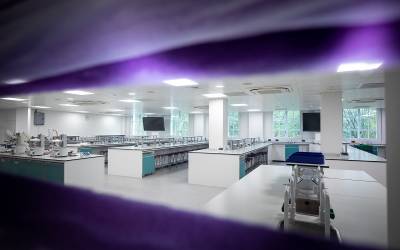Pharmaceutics Research Seminar
18 May 2021
Seminar: Modelling health and disease on a chip: the rapidly evolving field of microphysiological systems by Prof Christopher Hughes, University of California Irvine, Department of Molecular Biology and Biochemistry. Date: 20th May 2021 at 16:00.

ABSTRACT: Microphysiological Systems, otherwise known as "organ-on-chip" or "body-on-chip" technology have the potential to transform how we screen for drugs. The systems provide much greater complexity and a more physiological environment than standard 2D models or spheroids, while also offering multiple advantages over mice, including being fully human cell based. In this talk Dr. Hughes will present his lab’s work on developing organ systems that incorporate perfused vasculature, which thereby allows for truly physiologic drug delivery to target tissues.
BIOGRAPHY: Professor Hughes is a faculty member in the Department of Molecular Biology and Biochemistry, and recently stepped down as chair after serving for 10 years. He is also a faculty member in Biomedical Engineering in the Henry Samueli School of Engineering, where he served for 5 years as Director of the Edwards Lifesciences Center for Advanced Cardiovascular Technology.
Professor Hughes’ research focuses on the development and growth of blood vessels. The work in his lab spans multiple scales – from understanding the basic molecular mechanisms of angiogenesis (the growth of new blood vessels), to engineering of artificial tissues. Recently his lab has been pioneering “Body-on-Chip” technology, which allows for micro-organs – heart, pancreas, tumor, etc. – to be grown in the lab, each with its own blood vessel network. These “Vascularized Micro-Organ” and “Vascularized Micro-Tumor” devices provide powerful new tools for modeling and understanding complex tissues.
Professor Hughes has published over 100 peer-reviewed research manuscripts and in 2014 was elected as a Fellow of the American Association for the Advancement of Science (AAAS). In addition to his research, Professor Hughes works extensively with the non-profit organization, cureHHT, which provides patient support and research advocacy on behalf of those suffering from the rare vascular disorder Hereditary Hemorrhagic Telangiectasia. Professor Hughes served for 8 years as Chair of the foundation’s Global Research and Medical Advisory Board and now chairs its North American Scientific Advisory Council.
Further information:
- Speaker: Professor Christopher Hughes profile
- Organiser: Dr Dario Carugo profile
- Date: Thursday 20th May at 16:00
 Close
Close

